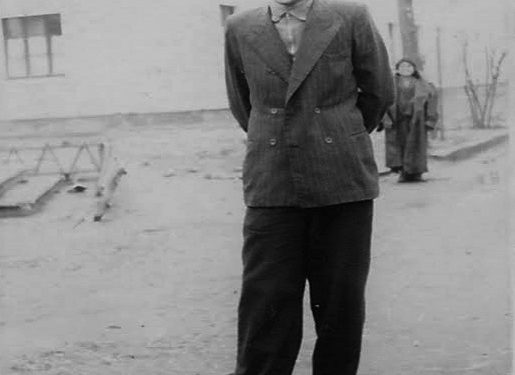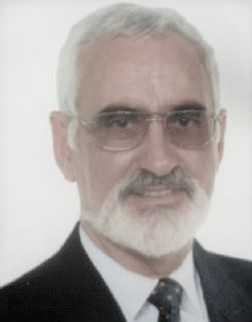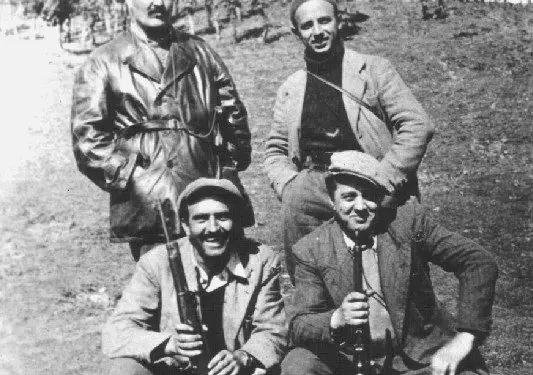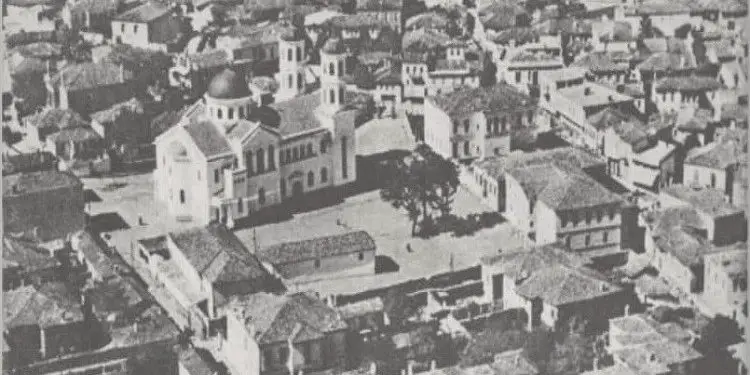By Thanas L. Gjika
The first part
Memorie.al / The history of our people, since the old times, is filled with acts of bravery of idealistic people, who did not spare their lives, for the benefit of society and the homeland. Thanks to them, our people have gained freedom from foreign yokes and moved towards progress. There were such people even during the years of the communist dictatorship. They dared to express their opinions in a different way, even to oppose the party-state line, but that regime arrested them, sentenced them with its trials, without a defense lawyer and declared them; “enemies of the people” and tortured them in prisons and labor camps. When they managed to get out of prisons, or return alive to their homes, state propaganda covered them with such epithets, so that the people would abandon and hate them, until they died out and were forgotten as worthless beings. Today’s time demands that such people should not be forgotten, but should be studied and appreciated, because their lives and deeds have regenerative values for the nation. We too, like any nation, need such torches of freedom and democracy. One such person was Thanas Ilo Qeleshi who, in his early youth, was conquered by communist ideas and joined the Communist Party, but when he saw some unjust actions of its politics, he dared to show his disapproval and to create a party cell, opposed to PPSh. To the life and achievements of this idealist, we dedicate this short essay, based on some documents and memories, that his son, Mihallaq Th. Cell, which I met here in the US.
Thanas Ilo Qeleshi was born in Korçë on March 17, 1929, in a craftsman’s family, who had tried the curve of America for many years. His grandfather Thanas, after whom he was named, worked in the early 20th century in Saint Louis MO. And his father, Ilo Thanas Qeleshi, was a shoemaker who had his own shop in the city bazaar, where he produced and sold shoes.
Usta Ilos’ wife, Katerina, had set up the tool at home and made carpets, which she sold at the city bazaar. This family, before the occupation of Albania by Fascist Italy, with the income of both spouses, had ensured a good economic condition and belonged to the middle class of the society of the time.
She had built a stone house with two floors, with a yard in front and a garden in the back, she had given birth to and was raising four beautiful and healthy children: two boys and two girls, Gaqo, Thanasi, Dhorka and Pavlina. He had sent the eldest son for education in Vlora to the Commercial School and the eldest daughter to Tirana, to study at the Nana Mbretneshë Female School. However, the two older children, brother and sister, were soon conquered by communist ideas. Gaqua and Dhorka had become members of the Communist Youth Group and after the formation of the NPSH; they were included in the ranks of this party.
Gaqua convinced his father about the good that the Albanian Communist Party intended, which propagated freedom, equality and justice among people, economic abundance and a democratic Albania, which had not been seen in a dream, during the reign of King Zog and during the invasion Italian. So he, with his father’s permission, returned his house, based on the Anti-Fascist War.
There he collected war munitions and delivered them to the partisan forces, wrote tracts, pasted them on the city walls, etc. In that house, in 1942, he created the NPSH cell for the Saint Triadha mahalla (neighborhood outside the city), making members the sons of the mahalla; Dhori Panariti, Rita Marko, Mikail Trebicka and Tasi Marko.
Unfortunately, Gaqo was captured and imprisoned twice by SIMI (Italian Service) forces. The second time, the carabinieri tortured him so badly that he became seriously ill and died on March 1, 1943. He failed to see how the NPSH eliminated Anastas Lulon and Sadik Premten, those who made him a communist, and whether The NPSH “realized” the promises, for which he gave his life.
His brother Thanas, during the Anti-Fascist War, was activated by him as a guerilla in Korça. Being serious and tall, this guy gave the impression that he was older than his real age. From the end of 1944, being a martyr brother and an activist of the War, he became active with the communist youth of the city of Korça. In March-April 1945, Gaqo’s friends, who gathered in Tirana, took Thanasi with them and activated him there as a youth activist. There they enrolled her in a nursing course.
In April 1945, Alqi Kondi was elected by the Communist Youth Congress of Albania, General Secretary of Youth. Since this cadre recognized and liked the resourceful young man, Thanas Qeleshi, he took him to his office as a secretary. However, after two months, Alqi Kondi was accidentally killed when his motorcycle collided with a car. This event shocked Thanas, and without consulting anyone, he asked to leave Tirana and return to his parents in his hometown, where he enrolled in Korçë high school, which he graduated in 1948. In May 1948, he accepted into the ranks of the Albanian Communist Party. With the beginning of the new school year, 1948-1949, Thanasi started working as a teacher in the border village of Arrëze. The director was a local boy, his name was Shaban Hysolli.
On the outskirts of the village there was a family’s house, which worked its land very well and received more produce than other families. The owner of the house, during the War, had brought water into the house from a nearby spring. Thanas was assigned by the village council to stay with that family, thinking that there he would find greater peace and cleanliness than in any house in the village.
The fellow villagers loved that family, even the school director, but the Vice President of the Korca Internal Affairs Department did not like him, who influenced the party delegates from the city of Korca to declare him a kulak, i.e. to tax him more a lot even though this family had as much land as other families. The implication was clear; that family had to be attacked in order for the class war to take place in that village as everywhere.
One morning at the end of May 1949, the village woke up surrounded by the border forces and the reinforcements that had arrived from the police of Korça. In the house, where the teacher was sleeping, Ferit Sinica, Vice President of the Internal Affairs Department of Korça, entered with several policemen. The teacher was ordered to come urgently to the office of the People’s Council of the village. The members of the party cell, the school director and the chairman of the Council were gathered there. The meeting began. Ferrit Sinica took the floor:
– “The party cell and the school personnel have not performed the task assigned to them by the party”. Then he hardened his voice: “Under your nose, the enemy of the class has been having fun, you Thanas Qeleshi, last night you had dinner with the village kulak and he, after you were asleep, took his family and escaped. Your mistake is very serious. You have burdened all of us with responsibility”.
Further, the school director and two communists spoke, who said that; the members of that family and its children were correct in behavior and that no one had heard any dissatisfaction from them.
Thanasi got up, calmly, said:
– “Comrade Ferit, I don’t feel guilty. And none of us are to blame. During the months that I have lived in that family, none of its members have expressed any dissatisfaction towards the government. You should find the mistake in the policy that you have followed with the authorities.
You declared the kulak, the best family in the village, the family that worked the hardest, that had managed to live better, working and not exploiting the work of others and not being servile. You antagonized that family, the party and the government and forced him to find a way out, escaping…”!
Feriti did not extend it, but closed the meeting by saying:
– “We will examine this with the relevant bodies of Korça”.
He went to the city and started from work to invent things that would burden the biography of the teacher and the school director. After two weeks, when the principal and the teacher of the school went to Korça, they were arrested as “enemies of the government and collaborators of the enemy”.
They were kept in the Korca Investigation for more than a year. They were constantly pressured to admit that they had collaborated with the kulak’s family and that they had helped him to escape, but they did not accept such lies. Shabani was released after a year of investigation, after the intervention of some friends of his brother, who worked in the Department of Internal Affairs of Vlora, while Thanasi appeared in the rigged trial and was sentenced to eight years of imprisonment.
At that time, attempting to escape was punishable by seven years of imprisonment, while Thanas Qeleshin, without attempting to escape, was sentenced to one more year. Usta Ilua go to Tirana to seek help from Rita Marko and Dhori Panariti, friends of his sons, who had been appointed to high party and power positions?
They mentioned the death of the older son, from torture, the help he had given them during the War, the activity of the younger son, who was now being condemned by the party for a few words…! But such communists lacked the spirit of sacrifice of war martyrs. They refused to intervene, because the critical words of Thanas were foreign to such people, who were making a career, walking on the path of servility and blind submission.
Thanasi was released before the deadline, in July 1953. The decision to release him was not an expression of the generosity of the party, but of an event related to Ferit Sinica, the former vice-president of the Internal Affairs Department of Korça. Ferit had served as a stuffed cocoon, to be emptied according to the orders of his superiors. During the War, he killed as an assassin, without asking who he was killing.
After the war, he arrested, tortured and killed anyone he was ordered to by his superiors. However, during the years 1950-1951, when he went out to collect the peasants’ debts, many of his cousins, friends and relatives, who had sheltered him during the war, complained to him that the debts charged by the state were high and they did not they had to pay them.
Feriti, seeing for him their economic situation, had agreed with these complaints and during a dinner, after drinking, he had said: “The peasants, they don’t have to pay such high obligations; the Party has gone too far”. One of those who heard it, reported it to the Security authorities.
The head of the Department of Internal Affairs, afraid that this cracker might commit some revolting act, or bring to light the shenanigans they had committed together, decided to eliminate him and eliminated him with the help of two people from the Security, his subordinates and friends of Ferrite. After the murder, according to the pre-prepared scheme, word got out that Ferit Sinica wanted to escape, but the vigilant employees of the Security Service killed him before he approached the border.
After this event, the family members of Thanas Qelshi became interested and managed to verify the slander that Feriti had concocted against their man. Thus, the former teacher Qeleshi was acquitted and the party bodies of Korça told him that they would return his salary for the years of imprisonment, as well as the Party tessa, recognizing his seniority, since 1948, when he entered in the party. Thanasi, in order not to receive the party’s tessa, refused to receive even the salary of the years of the sentence. He only asked to start work, as a teacher. He was appointed in the village of Selce in Lozhan.
In the prison of Korça, during the years of his sentence, Thanas got to know some intellectuals, such as; Tefik Selim Mborja, former deputy of Zog’s government, politician and diplomat; Koci Shenjti, a graduate of the French High School and a former collaborator of the Evangelical Bible Mission, as well as Osman Leskoviku, nicknamed Osman Gazepi, adjutant of King Zog, a very popular soldier and a sharp joker, etc.
These fellow sufferers, with their conversations filled with “anti-communist salt”, had influenced Thanasi’s worldview and extinguished his early enthusiasm for communist ideals and the NPSH. After being released from prison, he closed in on himself and started to stay away from the communists.
The action that pushed Thanas to further lose respect for the communists was the tragic event that happened to him on his wedding day. A few weeks after being released from prison, the people of the family were interested in finding a suitable bride and made acquaintance meetings between Thanas and Marika, a wise and charming girl.
They liked each other, but the girl’s father and her brothers, communists, said that they could not give Marika, a former political prisoner, with her head still shaved. Thanasi showed them the document of his release from prison, with innocence, then he decided to get engaged and, after a couple of months, a modest wedding was organized.
One afternoon in the fall of 1953, wedding tables were set in the backyard. In the middle, there was the table of the groom with his parents and the bride, on one side, there were tables with the people of the tribe, most of them members of the party: sister Dhorka, with her husband, Pavlina, the bride’s family members, cousins, etc. On the other side, there were two small tables, with some neighbors and two friends of the groom: Tefik Mborjen and Koci Shenjtin, former prisoners.
Before starting to eat, Petro Shallua, the brother-in-law of the groom, the husband of sister Dhorka, that is, the great son-in-law of Uncle Ilos, stood up and said in a harsh voice:
– “And with whom have you sat us down to eat and drink, O Ilo, with the enemies of the people, with Tefik Mborje and Koci Shenjti”?! And brought out the cobra.
Usta Ilua stood up and explained:
– “You from those tables, you are my friends and you have business with me. These two tables are our neighbors and two friends of the boy”.
The bridegroom stood up and addressed Petros:
– “This is not the place to show us the cobra.” My father invited you, and I invited these two. I have gone through the sufferings of prison with them and I want to enjoy this joy, together with me. Comrades in prison are compassionate, like comrades in war.”
When the communists heard that the prison comrades, the son-in-law valued them the same as the comrades of the war, they became angry and lashed out against Tefik Mborje and Koci Shenjti. They started to beat them with fists and kicks. These, in order not to spoil the wedding, did not object, but left.
The bride fainted; the groom lifted the bride in his arms and pierced her inside. Ilua intervened for reconciliation, but the Khrushks were not listening, everyone started to leave. Thus the long-awaited wedding was ruined. For some time, the eldest daughter, Dhorka, under the influence of her husband, did not visit her parents.
That’s how the communists of that time were; they broke up the wedding and didn’t talk, not even with their mouths. They did not know how to ask for forgiveness. Maybe like that, there are still some of them left…! On August 31, 1954, the new family added a son, Mihallaq. On the occasion of the 10th anniversary of the liberation, Thanasi was awarded the Medal of Valor, and in 1964 he was awarded the Skenderbeu Decoration.
In 1960, the family was expanded with a daughter, who was named Katerina, in memory of her grandmother. Bride Marika, after giving birth to her daughter, had weakness and stenosis of the nitral. Thanasi requested to be transferred to a village closer to the family. His request was taken into account and he was appointed a teacher in the village of Vashtemi, where he used to come by bicycle every weekend. /Memorie.al
The next issue follows















